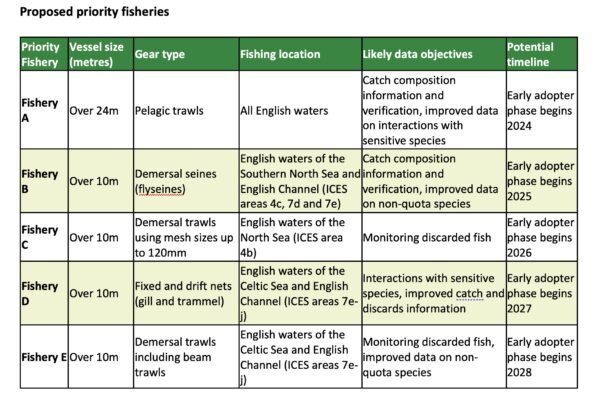Large trawlers fishing in English waters will soon have to install cameras that will monitor their catch, the Government has said.
Known as remote electronic monitoring (REM), the cameras, along with gear sensors and GPS trackers, will collect data on the size of catches as well as types of species caught and will be introduced in stages over the next five years.
Defra said the measures, set out in a new consultation, will be voluntary at first but will eventually become a legal requirement for all pelagic trawlers over 24 metres fishing in English waters.
The Marine Conservation Society (MCS) said it welcomed the Government’s plans on introducing REM, calling it an “important first step towards achieving fully documented, transparent, and sustainable fisheries”.
The Future Fisheries Alliance has long called for improved at-sea monitoring for vessels fishing in UK waters, and saw encouraging signs in September 2022 when Natural England recommended the immediate roll-out of REM to vessels that have the highest impact. The Alliance is a collaboration between WWF UK, Marine Conservation Society and RSPB and the coalition believes it should be a mandatory requirement to have REM on all vessels fishing in UK waters.
Proposals for expanding the use of remote electronic monitoring in English waters
Defra has launched a consultation for expanding the use of remote electronic monitoring in English waters. It proposes an approach to the long-term adoption of remote electronic monitoring that moves from pilots to fishery wide implementation alongside policy reforms such as Fisheries Management Plans and a new approach to managing discards.
Quick view: What is remote electronic monitoring?
Remote electronic monitoring is a catch all term that refers to integrated on-board systems that may include cameras, gear sensors, video storage, and Global Positioning System (GPS) units. These systems can capture comprehensive videos and are used to monitor fishing activity with associated sensor and positional information.
Defra’s vision for remote electronic monitoring
Defra’s is for fully documented fisheries in English waters. Remote electronic monitoring delivers robust information and evidence and is the next step for enhancing data collection. Better data, collected through a fully documented fishery that uses remote electronic monitoring has scientific applications, for example feeding into stock assessments, and can also support reforms to fisheries management. In some cases, the use of remote electronic monitoring may be essential for reforms to be successful.
Defra’s proposed approach
Defra proposes beginning implementation with vessels that sign up to be early adopters within the priority fisheries (see table below). The voluntary phase would remain in place until implementation issues have been appropriately addressed. Following that, there would be a mandatory phase. There would then be a minimum 24 months lead in time before mandatory requirements were introduced. This is to ensure industry has time to adapt to the change. It will create a rolling programme where remote electronic monitoring is phased in across different fisheries in stages.
How have the priority fisheries been identified?
Defra conducted a desk-based evidence review to identify priority fisheries.
A key output from the review was the exclusion of vessels under 10-metres in length from these proposals. Under 10-metre vessels make up a significant proportion of the English fleet but, within the priority fisheries proposed, are responsible for a small proportion of landings, and are often targeting different species to over 10-metre vessels. The decision to focus on vessels over 10-metres in length at this stage reflects the need for the expansion of remote electronic monitoring in English waters to be risk-based, proportionate and pragmatic.
Proposed priority fisheries
Responses
This is a 12-week consultation running from 17July to 9 October 2023.
Further information on the REM consultation can be found here.

